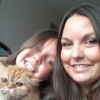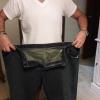Search the Community
Showing results for '"weight gain"'.
Found 15,901 results
-


It's not the failure that kills you...it's the giving up that will!
Bluesea71 replied to I Can and I Will's topic in Tell Your Weight Loss Surgery Story
I am 13 months out from surgery (at goal weight) and frequent the BP boards for the exact reasons you stated. I agree that it is way too easy to become relaxed once you are at maintenance and let old habits creep in. I find "checking in" daily helps me with accountability and even though reading the same posts over and over again from the newbies about hair loss, Protein intake, incision care, the best Protein drinks to buy, Vitamins making them sick, etc. gets really boring after awhile, I'm also reminded of the rules over and over again that I should be following that I sometimes have become relaxed on! Reading these posts and sharing my experience helps keep me on track! I help them to help me! Sadly, it becomes all too common for those of us farther out from surgery to abandon the support of these boards. I think that is a BIG MISTAKE. The reality is there IS truth to a honeymoon phase. There will come a time were you will stop losing weight. There will come a time where you can eat whatever you want. I chuckle every time I read a post from someone who just had surgery worried that they can hardly eat anything. Now with that being said, I can now sit in a restaurant and eat like a "normal" person but my new normal is far from where I was pre-surgery. I know how big my new tummy is and I don't try and eat beyond it's capability. I still get a full feeling after eating 3/4-1 cup of food. Certain foods now make me feel sick (sandwiches) so I avoid them. I didn't come into this process with food addiction issues (PCOS contributed to my weight gain) so I had one less thing to make the process difficult. With that being said, I even find old habits starting to creep in. My tendency not to plan meals ahead of time and eat on the go was a biggie for me. I was finding myself eating out more than a few times this past week. These extra calories will add up over time. I'm being extra vigilant planning meals ahead of time this week. We all need to take a look at what contributed to our weight gain. Especially those dealing with food addiction issues. It is common to substitute one addiction for another. What I can say, is losing weight has been the easy part in this process for me. I was able to get to my goal weight without issue. What I wasn't prepared for was the process I would go through in accepting my new body. I still view my body with a fat lens at times and its only when I see myself in photographs that I realize how much weight I've lost! Anyway.... Welcome back! There's no judging here. The fact that you came back and made your post shows how committed you are. I applaud you for sharing your experience with others. Let the newbies learn from our mistakes. We will continue to pick ourselves up and carry on. This is a ongoing journey that never ends. We are all here to support you. ???? -


Fat Shaming Husband...so hurt
yerawizardamy replied to Bluesky1's topic in Gastric Sleeve Surgery Forums
Agreed with the above statement. There is nothing in the OP's statements that suggest he is using "tough love" or saying something right in the wrong way. He is emotionally and mentally abusive, plan and simple. Telling your spouse what they can and can't eat is controlling behavior that is very typical in abusive relationships. The OP states that she is completely dependent on him, which may be circumstantial, but it is another very common aspect of abuse. Make them dependent on you, and they can't leave. Verbally beat them down to make them think they aren't worthy of their love, or anyone else's, and they stay because they believe they are lucky enough to have anyone. While her husbands actions and statements might not seem like huge red flags flashing "Abusive person alert!" these things tend to escalate. It never goes from 0 to 100 over night, it's a relatively slow and gradual shift. To the OP - I am very very sorry that your husband is treating you this way. I am very happy to hear you are going to get counseling, I think that is a positive step in the right direction. Please know that there are a lot of support groups out there that can help you for both your spousal issues and your health/WLS needs. I find it very interesting that while he is "disgusted" by your weight, he does not support you in your decision to get WLS which would help you to lose the weight. Also, it seems like maybe a good portion of your weight gain was health related? You mentioned applying for disability benefits, I just wonder if the weight gain was because of overeating/food addiction or because of your health problems. Either way, I truly hope that it helps you find what you need and gets you to a better place. -


Why do I hate myself NOW?
lalalisa replied to ewhitt's topic in PRE-Operation Weight Loss Surgery Q&A
I have been experiencing this as well. For me I think I was in denial about the way that I look. Since beginning this process I have had to open my eyes and face the facts of my weight gain. I've had to be honest with what I eat and why; so much of this is psychological. At a support group I attended they said, "we operate on your stomach, not your brain; we'll fix the stomach but you have to work on the rest". I was and am a happy person; part of maintaining this was denying what I was doing to myself. I don't know if this applies to you; just something I have been coming to terms with. Keep talking about it; just knowing someone else is going through this is helping me and I'm sure others; thanks for sharing -
Wow, I just posted something similiar in my 1 yr bandaversary thread. very similiar stories. Dh and I got together after one of my starvation modes. I was thin all of 5 mins, but it was in that 5mins I met him. It took me about 6 mths to slowly work my way back up to the huge weight I was before and the poor guy didnt know what hit him. With the weight gain came all my fears and demons again. It was a terrible 4 years or so before I was banded, I dont know how we survived, but we did. I wish you all the best and I truely know how you feel. hugs
-


Where are all the seniors?
CarrieBrownsville replied to SassySenior's topic in LAP-BAND Surgery Forums
Hey Karen, thanks for your note. My surgery is Monday, and nothing was said about the weight gain. I'm all set to go. I didn't have to have the liquid diet or a pre-surgery diet, so guess I was pretty lucky. I'll keep you posted on how it goes! -
This is my take on the issue: IMO... I repeat... IMO... The formula to avoid is: Low Calorie Diet + Low Exercise/No Exercise/Low Heart Rate Exercise = No Long Term Success! / Flabby Skin Results / Excessive Loss of Lean Muscle Tissue... I recommend: REASONABLE Band Restriction + Moderate Calorie Deficit created by a combination of exercise and diet (rich in lean Proteins, moderate in complex carbs, light on simple carbs), low to moderate in fats (especially saturated/trans ) + Copious amounts of 60%-85% cardio workouts + light to moderate strength training = Gradual Persistant Progress with Long Term Success! If you're already dealing with a depressed metabolism due in part from eating so few calories - then increase your calorie intake slowly. A rapid swing in calories going up will almost certainly result in a weight gain. Add maybe 100 - 200 every third day. Protein shakes??? IMO these are for supplemental purposes long term. Once you're able to eat solid foods - you should be getting most of your protein from lean solid sources. Solid foods and liquid foods will have different impacts on your metabolism as well. When you can't get a meal in or you aren't getting enough protein, supplement with a shake. Your body can store fats, your body can store carbs, but it cannot store proteins. A highly excessive protein intake can be coverted to stored fat - but it is a costly conversion compared to the other macronutrients. I have found it's best for me to eat small amounts very frequently. I'm not even certain I'd call them all meals - but every few hours I'm eating a food source that is a reasonable mix of carbs/fats/protein. It helps keep blood sugars stable, energy stable, and metabolism cranking. Good Luck! Brad
-


Sleeve Verses Rny - Friend Pleading That I Shouldn't Get Sleeve
Fun size replied to HOLLAND's topic in Gastric Sleeve Surgery Forums
Holland, I did extensive research before I chose the sleeve. I am a breast cancer survivor. I am 61.5 years, 4'11 tall. Being older and short makes losing weight more difficult. I was sleeved on 11/12, down at least 10 pounds in two weeks and I feel fabulous. My research led me to believe that, in the long run, the sleeve is substantially safer. Ten years down the road, the people who were not deligent about taking Vitamins (and for RNY that's a ton of vitamins all day, every day) experience serious health issues due to malabsorbtion of nutrients. Their teeth rot, their hair falls out, they have physical health issues. I already know that I am not going to remember to take all those vitamins. I also know that I don't want anything rerouted. Period. I went to six months of support group meetings before my surgery. What I learned is that the RNY patients still had issues with hunger. Not some. Most. I also met people who gained a lot of weight back. One patient has never lost weight, but she eats alot of pizza and ice cream (some mental health issues there). There is a thread on this site titled "weight gain with the sleeve" or something like that. Read it. My Dr.'s practice is a Center of Excellence. Not sure what that means, but my RN daughter says it's a big deal. He does RNY and Sleeve. If the sleeve wasn't good, he wouldn't do it. Just like everyone said, do your own research. You can change your mind at any time. You need to be happy with your choice. Your friends and family love you, want the best for you. After you do our research, show them the facts and how you came to your decision. -


Whats the longest stall you have had and at what month did u stop losing?
Catracks replied to loveit1222's topic in POST-Operation Weight Loss Surgery Q&A
Thanks Cheri. I know from prior posts that you were a slow looser and that slow does not mean unsuccessful. I understand the frustration of hearing people complain that they have only lost 30 pounds in the first three weeks after surgery LOL! I am 5'1" and shooting for 130. Like I said, I suspect I have 10+ pounds of skin. Right now I wear a size 6 comfortably. I was trying on pants last week and noticed that if it weren't for the panni, I could easily wear a size 4. I forgot that I have no hips. I am constantly having to pull my pasts up as they slide over the non-existent hips and get stopped by the lower stomach skin. My surgeon's goal for me is 110. I think he's nuts. I would be a size 0 or less. No thanks! I will try the strength training. I have equipment at home for that. All I need to do is pick it up. No extra money for a gym. It's funny, but when I do exercise there is a weight gain that accompanies it at first no matter what the calorie deficit is. Connie and Aussie: One week? Nahhh. Two weeks is a little more frustrating, but they can last 1-2 months despite the fact that you are doing the same thing you had been doing when you were losing. Both Cheri and ButtertheBean and others have posted detailed explanations on stalls. The simplistic explanation is that your body needs time to readjust after a weight loss both in chemical terms and physical inches. I sometimes think that the body is actually redistributing flesh. If you are doing everything right and not losing pounds, do not over-worry. Keep with it and you will lose. There are some that say changing up or playing with the numbers (protein, fat, carbs, exercise, etc.) will shock your body, but my experience up to now has been to wait it out. This may have changed for me since I'm close to goal. Cheri knows what she is talking about. I am with a few pounds of what I was just before Christmas. This morning I tried on a pair of pants that were super tight that I have not worn since then and I am swimming in them. The lose skin that I did not think was so bad a couple months ago is more noticeable now. I mentioned in another post that I actually have loose skin on my fingers. Don't let that scare you BTW. I'm 47 and had a 46 or 47 BMI when I started. It's so much better than the fat. Cheri - Keep us posted on that baby of yours! Named yet? I named my daughter when she was 3 weeks old - I mean 3 weeks from conception I was calling her by name. Yes, I'm weird, but she was long wanted and I have to plan EVERYTHING is advance :-P -


Insurance Approval And 6 Month Supervised Diet
NWgirl replied to lucky2bLAURA's topic in PRE-Operation Weight Loss Surgery Q&A
I am not required to do a 6 month diet, but recently read someone else had been on a 6 month diet and was required to do another 3 or 6 months due to weight gain. Not sure if this is the norm or not. -


For anyone considering lapband.
Julie norton replied to Band07's topic in Tell Your Weight Loss Surgery Story
I thank those who post about sudden or long term problems with the band. It would appear things are going along ok for some of them for years and then big problems and weight gain. Frankly, this scares me. I've adjusted to banded life for over 8 years and am very compliant....but hear others are as well and then BOOM ... Their life changes. Maybe long term success with the band people just don't post often? I know there are many of us out in the world????just wanting to believe that I suppose -


Anyone Disappointed In The Amount Of Weight Lost? Wish It Was More?
jns replied to emmas mom's topic in POST-Operation Weight Loss Surgery Q&A
I do get disappointed at times. I lost most of my weight directly after surgery and now am averaging 1-2 pounds per week. I am eating on average 1100-1200 cals/day and am rather sedentary. I'll remind myself that I'm losing consistently, mostly do not feel the insanity with food--the BEST GIFT I could've been given, and am making permanent changes in the way I eat. I know I'll not only reach my goal in time but more importantly will be able to manage my weight long-term. In my experience, reaching goal quickly lends to more grandiosity which leads to rebound weight gain. -
Hey Fergieis Glad to hear your recovery is going fine - sounds like you are on of the lucky ones who got an easier recovery - I was still getting gas pains up to a month after my surgery. Don't sweat about the weight gain - you are going to be entering the next phase - the notorious "LAP-BAND® hell". You feel great and fine enought to push through and are excited to get started and see the results. However keep in mind that your insides just went through surgury that takes 4-6 weeks to recover from internally. If you are living in Wpg - they probably left a little fill in the band to see how your body reacts, but not enough to make a big difference so that you would notice it. LAP-BAND® Hell begins as you start to see the weight come off, then you plateau and bounce up and down a few pounds and if you lose less than a certain amount of pounds, you get a fill and if lose more, then its 'thanks for coming out - see you next month" and so on, until you hit the "sweet spot" - the correct amount of fill that allows you to lose to your goal weight. Everyone is different. And yes, it is typical to gain right after surgery - remember you were on a liquid diet for 2 weeks or more and light foods afterwards. What I did was replace the huge lunch meal I used to have with a broth Soup (eg veggie or chicken noodle), 1 oz of cheese and crackers dipped in the soup (they get soft) and Water to drink. For Breakfast, I do the carnation breakfast shake and water between lunch and breakfast. A piece of fruit when I get home to tide me over to supper. Supper is a normal meal - protien plus veggies and a reward at the end of the night - one of those 100 calories snack things. you are the first person I have heard of who likes the liquid chalk drink that those Medi protien shakes. Have you tried adding fruit to them - eg; bananna to the chococate - strawberries to the vanilla etc - this may fill you up further as well and prevent cravings. Diet Coke - avoid any carbonated bevvies for at least the first 4 weeks and my advise would be if you want to try - only 2 or 3 slow sips to see how your body reacts - the gas in the coke can give you horrible pains that you will regret if you try too much. I cannot do Diet Coke, it is absolute agony and I will not ever do it again - Club Soda and Lime juice is my bevvie of choice and the only carbonated drink I can do - only 1 and only about once or twice a week but never more than one. Some doctors recommend that carbonated bevs are cut out completely due to the gas. Okay - off the soapbox. BTW - keep us posted on the fight with the gov't and if you get anywhere. CHeers IWBAL
-


Can 15 or 17 year olds have lapband surgery?
JodiMc replied to pattygreen's topic in LAP-BAND Surgery Forums
I'm only 25 years old and preparing to have surgery (self-paid... have been saving up for YEARS as my insurance does not cover it) in September. I WISH with all of my heart that I could have had it done when I was around 19. That would have prevented so much weight gain for me and kept me so much healthier. However, at 15 and 17 there is NO WAY I was ready. I was still living at home with mom and dad and not responsible for my own actions in the capacity that I am today. -
I actually do better sticking to my diet plan when I weigh myself daily. I know several other people that do better that way, too. It's an individual preference, but you do have to know and understand the plateaus and even a little weight gain now and then. Water weight gain can be 5 lbs or more. It can happen if you eat too much salt, because of hot weather, as a warning sign that mother nature is about to come calling, or because someone in Thailand sneezed while you were putting on your shoes for that matter. : ) You just have to keep in mind that kind of weight gain will come right back off if you stick to the plan. My scale helps me keep on track. I almost always gain weight when I don't weigh every day.
-


Not Eating And Gaining...
Ms skinniness replied to jessfharris's topic in POST-Operation Weight Loss Surgery Q&A
The truth be told, he was probably cheating for a long time. This is his loss and your gain. Now it's time to focus on your recovery both physically from the surgery and emotionally from the cheating. You are going to be one hot chick and he is going to regret everything he's done. However, it sounds like your marriage was in trouble before you had this surgery so everything is on track. This is the universe speaking to you. Take care of you and do what you need to do. Stressors will cause weight gain but it's most likely fluid retention. Get back to eating your proteins and focus on you. You can only control you and what you do or don't put in your mouth. So don't let him stop you from getting the nourishment that you so need right now. -


What kind of birth control do you use?
Jenn1214 replied to aroundthetown's topic in LAP-BAND Surgery Forums
I've been using Nuvaring for about two years and I love it! I don't have to remember to take a pill every day and it doesn't make me feel crappy like oral contraceptives used to. I still use condoms anyway because I am so not ready for motherhood at this point, but it's supposed to be as effective as any other hormonal birth control method. My GYN said it also has a lower incidence of weight gain. Give it a try! -


What kind of birth control do you use?
sinda replied to aroundthetown's topic in LAP-BAND Surgery Forums
I've been on the pill (except when intentionally trying to get pregnant) since I was 18 for non-pregnancy-related reasons. If it caused weight gain, I didn't notice it then. (I'd switch to Mirena now, but my insurance won't cover it. Maybe in a year or two.) pills have always worked well for me. One caution, though, that I think someone else mentioned: it's entirely possible that as you lose weight, you will become extremely fertile. Make sure your GYN is keeping close tabs on you, because you might need to change the dosage of whatever you are using. -


Hello, everyone! My name is Dave.
catwoman7 replied to Dave In Houston's topic in Tell Your Weight Loss Surgery Story
1) I didn't eat sweets while I was in weight-loss mode, but I occasionally do now that I'm in maintenance. They don't bother me - but they cause about 30% of RNY'ers to "dump" (or at least if these folks eat enough of them, that is). It has to do with all the sugar hitting your small intestine at once - your system goes into overdrive to deal with it. If you're one who "dumps", the trick is to avoid or limit sweets (which we should be avoiding or limiting ANYWAY). But again, that first year or so, I didn't have any (except maybe a couple tablespoons of ice cream on my birthday). But yes - I do occasionally eat them now. 2) snacks depend on your surgeon's program. I was allowed snacks as long as they fit into my overall plan. I still eat snacks now that I'm in maintenance. I mostly just count calories now to keep my weight stable, so I just add the snack calories into my total for the day. If the calories work out, then the snacks are fine. What they DON'T want you doing (even those surgeons who allow snacks) are to "graze" - i.e., snack off & on all day. That can lead to weight gain. But some surgeons do allow a planned snack or two a day. 3) you'll be able to drink a ton of water after the first few weeks. I probably drink a gallon of it some days. You're just not supposed to drink while eating or from 30 minutes afterward (my surgeon says 60 minutes, but most say 30 minutes). It's hard to get all those fluids in the first few weeks after surgery, but after that no - it's really not. -


Getting Back To The "Green Zone" After Complete Unfill?
maygoddess replied to maygoddess's topic in LAP-BAND Surgery Forums
Thanks for your input B-52. You sound like you are truly listening to what your body and band want and disciplined enough to follow through with that. I think the majority of people who diet and lose and gain is because there is lack of discipline..desire is there, but our bodies tell us to eat when we KNOW we should restrict our diets. This is why diets fail and why we all got banded..but the same patterns of behavior are there that got us and kept us fat!! There are folks who successfully could lose weight on WW, Jenny, diet book of the day, etc etc and keep it off because they had that discipline. I like the idea of giving the pouch and esophagus a rest. I will incorporate that. DEFINITELY will be more mindful of what I eat and how much. My motivation to stay at my weight was all about leather! A one piece very unforgiving of even a few lbs weight gain motorcycle track suit. I love to do track days and it has been depressing to have had to miss out because this extra weight prevented me from fitting in that suit. I was gifted a suit form track friends in a larger size and had it altered a bit, but I told the leather guy that by the time next track season starts, I am hoping I fit back into my old one OR he has to alter the larger one down. I stare at my closet full of clothes that no longer fit, but also look at pics of me and want THAT person back again..the one that felt better in her body, achy joints back, not feeling like a lead balloon hauling around an extra 40+lbs. I think I will keep these size 14 work pants out when I get back into my usual 8's as a reminder to never go through this again! Tomorrow is the day for the journey to refills.. keep you all posted on how it goes! Green Zone here I come! -


Was your band removal and revision surgery done at the same time?
georgiare replied to Cleo's Mom's topic in Revision Weight Loss Surgery Forums (NEW!)
Yes, my revision was done all in one surgery. My surgeon said it was the most common surgery she does. @@giugiu37 my insurance paid for the revision because when my band slipped I regained most of the weight I had lost, so I had to get it out either way and the weight gain showed that I would not be successful without restriction. -


Does Anyone Else Have A Controlling Mother ????
Cazzy replied to ldjstonband's topic in The Gals' Room
Firstly u wont have ruined anything by drinking tomato soup, I had never heard of clear liquids only here in the UK .. our post-op is liquids i drank my weight watchers tomato soup from day 5 i think it was .. i was on liquids 4 weeks post op, then mushies 4 weeks then normal food, just dont do any liquids that have lumps in or u couldnt drink with a straw( not literally) , thats a liquid then As for comtrolling mothers.. did u think maybe your relationship with her was responsinble for your weight gain or some of it, it might well be u have to change your contact with your mum in order to cope with making the band a success for you. If she tells your doctor about the tomato soup he would probably laugh at her so dont worry about it, but start thinking about what is best for you and what u need, u have to come first till u have lost the weight u need to -
Hey guys, I need your help! I am a student in an experimental psychology class doing research on weight loss surgery. If you would like to participate please click the link below. Feel free to share the link! / https://www.surveymonkey.com/s/CNKNSMB
-


How do you deal with people telling you to stop losing weight?
Arabesque replied to Crick's topic in POST-Operation Weight Loss Surgery Q&A
Oh, the unsolicited advice & sometimes hurtful comments. People do get over it & as @ms.sss sud it becomes old news. Now I just get comments about how good I look 😉. When you first loose the weight it is a bit of a shock to others & yourself. They (& you) have a picture of you in their heads & it dues to align anymore. Like they can’t recognise you anymore. It takes time to get used to how you look being so much slimmer & for that fat image to be replaced. Also you will find that once your weight stabilises your remaining fat seems to resettle around your body. At first it seemed I had lost my hour glass shape & I had no butt at all. Now, my waist is definitely there again & I have a little booty but my weight has not changed. If you are working on toning you’ll likely notice the resettling more. And don’t forget either that muscle weighs more than fat. As @ms.sss also said your weight will be lower if you have skin removal. So it is something to take into consideration. I think you may even find that the abdominal fat you see is really just loose skin. I didn’t go down the skin removal path as I don’t have much loose skin. (It doesn’t impede me in any way & isn’t noticeable even in fitted body con clothes.) There are a lot of factors that influence how much loose skin you end up with: highest weight, how long you were overweight, age, gender, genetics, weight gain & loss history, etc. So you can never really compare what you look like with others. Though we’re human & we can’t always stop ourselves doing that. 😉 I always say you have to find a weight you are happy with, are healthy at & can maintain without having to make too restrictive sacrifices that limit how you enjoy your life. Only you know what weight that is. Congrats on your weight loss. You’re looking amazing. -


Decide not to have surgery?
fernandfj replied to MarciaN's topic in General Weight Loss Surgery Discussions
I opted for sleeve surgery a few months back because my weight gain had been large enough that it was compromising my mobility. I had always had success with weight loss, the most being ten years ago when I lost 100 lbs. IN four years I gained it back and another 50 over the next few years after that. I knew I can lose the weight while dieting, but I was uncertain I could maintain it. The sleeve offered me the option to physically restrict food intake and calories. While it's only been three months, I am ecstatic with the results so far. It is hard work and tales perseverance, but I needed this change and I could not have accomplished what I have so far by dieting alone. You should takl a look and decide what works for you. -


Average age of a Bandster?
CherieLynne replied to Kellster's topic in General Weight Loss Surgery Discussions
I'll be 57 or 58 by the time I have it done, and my experience is just like yours...menopause kicked me into weight-gain overdrive. I'm thrilled to hear it was easy going for you. Do you mind if I ask where you had it done, and what your experience was before/during operation? Thanks so much in advance.






